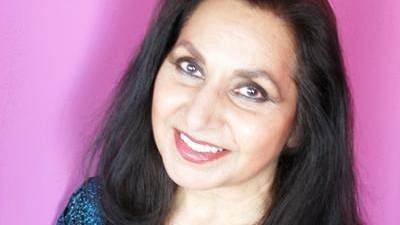New Delhi: A poet born in Pakistan and ‘adopted by India’ is expected to be named Britain’s next poet laureate.
Imtiaz Dharker, 65, a self-proclaimed ‘Pakistani Scottish Calvinist Muslim’, will be the first Asian and second woman in history to hold the prestigious position that stretches back some 350 years.
If named poet laureate, Dharker will succeed Carol Ann Duffy, the first woman to hold the position, whose 10-year term ends Tuesday. The role requires writing poems to mark major state events involving the Royal family.
Previous best-known poet laureates include John Dryden, William Wordsworth, Lord Alfred Tennyson, Cecil Day-Lewis, John Betjeman and Ted Hughes.
‘Adopted by India’
Dharker, who moved to Glasgow shortly after being born in Lahore, is a seemingly unlikely choice for a position steeped in English tradition.
On BBC Radio 4, Dharker had once joked that she is a “Pakistani-Scottish Calvinist Muslim, adopted by India and married into Wales”.
“…Don’t try to put me in a box…I’m a cultural mongrel,” she had said.
Dharker has a daughter, Ayesha, from her first marriage with journalist Anil Dharker, the founder and director of the Mumbai International Literary Festival. Ayesha is an actor, known for her role in the Tamil film The Terrorist. Dharker’s second husband Simon Powell, founder of the Poetry Live organisation, passed away in 2009.
Poetries of Dharker, who has lived in various countries through the course of her career, reflect the multitude of cultures and identities she was immersed in while growing up. She writes from a vantage point that straddles intersections of religion, identity, culture and feminism.
She writes of a “Merry Kissmiss!” in Mumbai in her 2014 collection Over the Moon when “… allovermumbai alloversky is fully full with paper stars”.
In Purdah, 1989, Dharker opens in Purdah 1 with: “One day they said she was old enough to learn some shame. She found it came quite naturally”.
When one of her poems was included in the New Blood anthology, Dharker wrote in the opening comments: “The image of purdah for me was on the dangerous edge of being almost seductive: the hidden body, the highlighted eyes, the suggestion of forbidden places. But of course it is also one of the instruments of power used to bring women to heel in the name of religion.”
Dharkar’s poems have been published in Purdah (1989), Postcards from God (1997), I speak for the Devil (2001), The Terrorist at My Table (2006), Leaving Fingerprints (2009) and Over the Moon (2014) — the last book apparently clinched it for the selection panel.
Also read: Allama Iqbal: Pakistan’s national poet & the man who gave India ‘Saare jahan se achha’
The search for the poet laureate
The Queen of England customarily appoints the new poet laureate on the advice of the Prime Minister. The Telegraph reported that British Prime Minister Theresa May, who is still at the centre of Brexit row, turned to her culture secretary Jeremy Wright to find the best-suited candidate for the position.
According to Daily Mail, UK, Wright had convened a 15-member committee of “poetry experts”, including current laureate Duffy, to decide the next laureate.
Nearly five years ago, when Dharker was awarded the Queen’s Gold Medal for Poetry in 2014 — an honour accorded previously to W.H. Auden, Philip Larkin and Ted Hughes — Duffy had extensively praised the multi-cultural poet, talking about how Dharker “drew together her three countries, Pakistan, Britain and India”, to create “writing of the personal and the public with equal skill,” The Guardian had reported at that time.
“Whether Imtiaz Dharker writes of exile, childhood, politics or grief, her clear-eyed attention brings each subject dazzlingly into focus,” Duffy had said. “She makes it look easy, this clarity and economy, but it is her deft phrasing, wit and grace that create this immediacy.”
While the post of the poet laureate is far from being financially lucrative — with an annual salary of £5,750 and a “butt of sack” or approximately 630 bottles of sherry — an Express, UK, report said the job description included “writing poems to commemorate major state occasions and events involving the Royal Family”.
Also read: This Pakistani rap is promoting peace with India, the kitchen talk way



